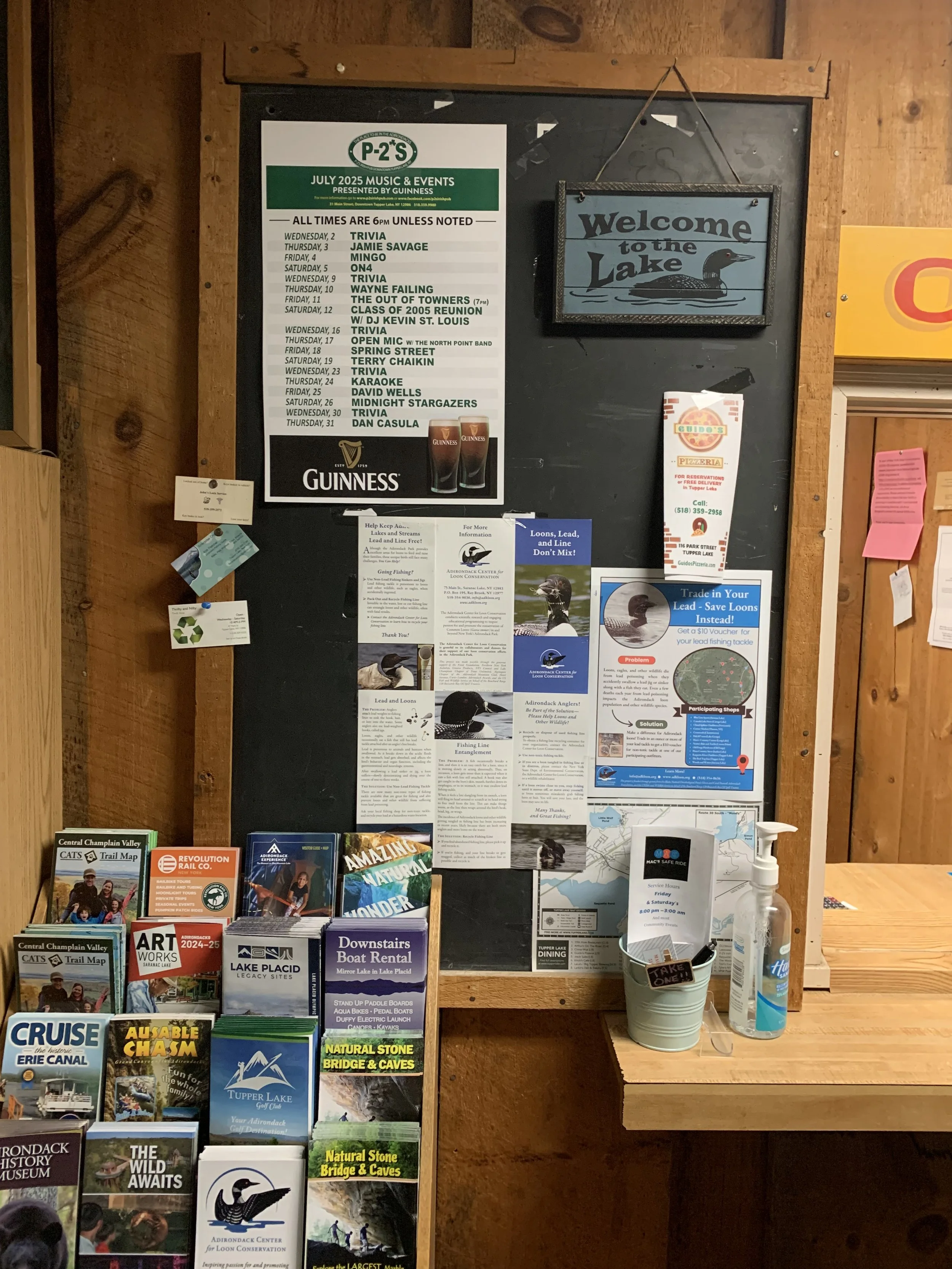Tackle Shop Spotlight: Red Top Inn, Tupper Lake, NY
Words & Images by Leah Boget, ACLC Wildlife Technician
Red Top Inn owner Jay Chojnowski displays some lead-free fishing tackle options.
The tackle shop at Red Top Inn in Tupper Lake, NY, is one of the area’s great spots for anglers to stock up on everything they need for a day on the lake.
One thing you won’t find in stock, however: lead fishing tackle.
Jay Chojnowski, owner of the Red Top Inn, has been participating in the Adirondack Center for Loon Conservation’s (ACLC) Lead Tackle Buy Back Program since its inaugural year in 2021.
Jay and his wife, Bozenna, have been visiting and vacationing in the Adirondacks since 1989. They fell in love with the area and decided to move here full time in 2003. They bought the Red Top Inn in Tupper Lake, which has been in operation since at least the 1950s.
“We love wildlife,” said Jay, adding that Bozenna is “crazy about loons.” They enjoy watching their resident pair raising a chick and often swimming in front of the inn’s dock. Jay is also an angler, and enjoys working with anglers who visit to buy fishing supplies or to spend a few nights.
After seeing firsthand the damage caused by lead fishing tackle and improperly discarded fishing line, Jay has become an advocate for fishing practices that are also safe for wildlife, including using lead-free fishing tackle and properly throwing away used fishing line.
Lead is particularly dangerous for loons and other birds of prey. They can easily ingest lead tackle that is still attached to fish and will die within two to four weeks from lead poisoning from even a half-ounce sized sinker. Improperly discarded fishing line is another danger to many different wildlife species that can easily become entangled and die of their injuries or of starvation if the entanglement prevents them from moving freely to feed or care for themselves.
The Lead Tackle Buy Back Program has been so successful at Red Top because Jay and Bozenna take an active role in educating anglers about the downsides of lead tackle for wildlife.
The Red Top Inn in Tupper Lake, NY.
Dock and lakeside seating outside the Red Top Inn in Tupper Lake, NY.
Jay calls himself a “loon salesman.” When customers pop into the tackle shop with time to talk, he relishes the opportunity to have longer conversations about loons and tackle, and will even offer to go through their tackle boxes with them to identify lead tackle and discuss the alternatives.
Getting the word out there is just the first step. The next step is for anglers to take action.
The billboard at the front desk of the Red Top Inn with educational material about the dangers of lead fishing tackle to loons and other wildlife.
“Local guys know loons need protection, they’re very good about it. But, are they willing to pay more for tungsten [weights and lures]? I’m not sure,” said Jay. He acknowledged the price difference between lead and alternative materials, but he disagrees with statements that there is a noticeable difference in performance. “It works exactly the same,” Jay said, speaking from his own experience. “I fish a lot, and the only difference that I recognize is that tin split shot stays shiny.”
Lead fishing tackle of a half-ounce or more is still legal to purchase and use in the state of New York. For many lead-free advocates, this is still too much lead in the environment. The toxic effects of lead on humans and wildlife have been well documented, with Greek physicians documenting symptoms tied to lead poisoning as far back as the second century BCE. For many, the dangerous effects of lead outweighs its useful attributes.
“There just shouldn’t be any lead around,” Jay said.
Jay sees the Lead Tackle Buy Back program as a way to help “preserve nature,” he said, especially as “animals and nature have less and less space... it’s important to protect what we have and to enjoy it.”
Anglers can still turn in lead tackle at at participating tackle shop and receive a $10 voucher to purchase lead-free alternatives. To see a full list of Adirondack tackle shops participating in the Lead Buy Back Program, visit our web page. To request a fishing line recycling container to be placed at a location near you, email education@adkloon.org.




